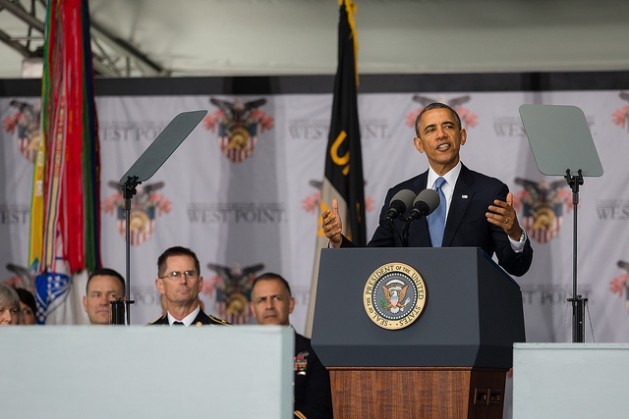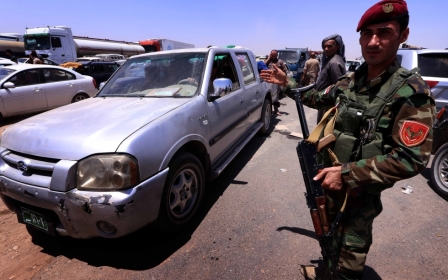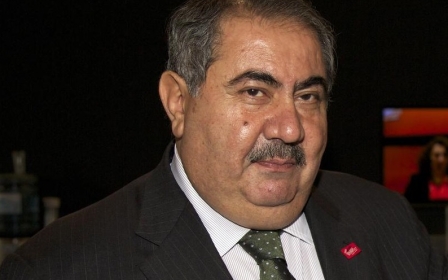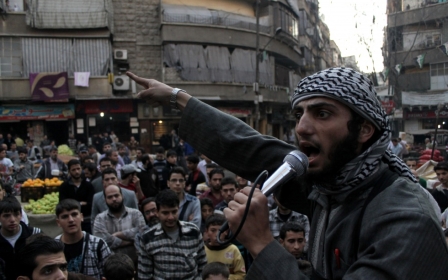Obama's impossible Iraq quandary

US President Barack Obama talked big, saying he is ruling nothing out in response to the Islamic State of Iraq and Syria’s surge toward Baghdad. But the White House’s lack of enthusiasm for becoming embroiled in Iraq once again was clear enough as it swiftly dismissed the prospect of putting American combat boots on the ground and spoke in generalities about how to confront ISIL, such as establishing a fund to help Iraq respond to the evolving threat.
Besides, the US administration has spent months resisting requests from the Iraqi government for US air strikes against the insurgents as the president sought to avoid being drawn back into a conflict he told Americans was behind them.
With a public that largely wants nothing more to do with Iraq on one side and Republicans clamouring to blame Obama for ISIL’s rise on the other, the president has no easy options. There is little appetite to expend more American lives. But if the insurgents retain control over swathes of Iraq and Syria even without seizing Baghdad, the Republicans will ramp up their accusations that Obama has allowed the establishment of a terrorist-run Islamic state that can serve as a springboard for attacks elsewhere in the region.
The speed at which ISIL has seized cities that the US sacrificed thousands of lives and hundreds of millions of dollars to control just a few years ago has shocked and distressed American military officials and politicians. The humiliation has been compounded by the realisation that the insurgents are using US military equipment abandoned by fleeing or surrendering Iraqi government forces.
But even leading critics of the president, such as Senator John McCain, are pressed to propose a response beyond generalities. McCain said he does not favour sending US troops back to Iraq. Instead he called for Obama to dismiss his entire national security team and reinstate General David Petraeus who ‘won’ the war in Iraq for the US. But McCain did not offer a strategy beyond that.
Lieutenant General James Dubik, a former US commander in charge of training Iraqi forces, said it is clear that the Iraqi military cannot halt the ISIL advance on its own and that the US should consider air strikes and sending military advisers.
The Iraqi government has been pressing for months for US air attacks to back its ground forces but there are strong doubts within the US administration that they would reverse ISIL’s momentum when the Iraqi military has not proved a capable fighting force and Prime Minister Nouri al-Maliki’s sectarian government struggles to command the support of large parts of his country.
In any case, the White House, already embroiled in a war from the air over Afghanistan, Pakistan and Yemen, is not keen to get involved in yet another. It had hoped to pass the buck to the Iraqis themselves with the delivery of F-16 fighters and Apache helicopters in the coming months. But the immediacy of the crisis looks as if it may force Obama to rethink his reluctance to add Iraq to his list of bombing targets, at least in order to be seen to be doing something.
Pressure from US legislators ratcheted up following a Pentagon briefing. Lindsey Graham, a Republican senator from South Carolina, described what he heard as “chilling”.
“Iraq is falling apart,” he said.
John Boehner, the speaker of the US House of Representatives, called on the president to respond to Iraqi government requests.
"I think what we should do is provide the equipment and technical assistance that the Iraqis are requesting,” he said.
But Boehner also did not appear to have an appetite for getting the US involved in the fighting once again.
Hillary Clinton, the former US secretary of state, told the BBC that she does not support military intervention and that American troops on the ground “is not going to happen”, at least for the foreseeable future. The US has little confidence in Iraqi military commanders, saying that Maliki has replaced competent senior officers with cronies. Clinton said the Iraqi military “has to have an injection of discipline and professionalism”.
While there are apparently few solutions on offer, there is no shortage of finger pointing in Washington.
Republicans are lining up to blame Obama, with the support of their party organ, Fox News. Boehner accused Obama of “taking a nap” while ISIL advanced. McCain blamed the president for “a colossal failure of American security policy”, saying that pulling the last US forces out of Iraq three years ago was a mistake.
"We are facing a disaster here, not only in Iraq but Syria. Extremist groups now control more territory than at any time in history," he said. "Our failure to leave forces behind in Iraq is the reason that Senator Graham and I predicted that this might happen and unfortunately our worst fears are being realised.”
The White House noted that the administration wanted to leave a residual force in Iraq but the government in Baghdad didn’t want them.
Other critics said Obama’s reluctance to give more weighty support to pro-western rebels in Syria left ISIL free to use a large part of Syrian territory as a staging ground for an attack on Iraq.
But Iraq’s former prime minister, Ayad Allawi, reminded Republicans of what they have studiously ignored - the responsibility of their own president, George W Bush, for Iraq’s implosion.
“Really the problem is that nobody cared what should happen to Iraq. It wasn't a matter of just removing the tyranny of Saddam Hussein. It was clear that there was no post-conflict policy after the downfall of Saddam and everything went in a bad way, ultimately in a sectarian way and the vacuum was filled by Iran and by other regional powers unfortunately in Iraq,” he told the BBC.
- Chris McGreal is a former correspondent for the Guardian in Washington, Jerusalem and Johannesburg. He now reports from the US. He has won several awards including the Martha Gellhorn prize, the James Cameron award and Amnesty International press reporter of the year. McGreal is author of Chaplains of the Militia, an investigation of the Catholic church’s complicity in the Rwandan genocide (http://guardianshorts.co.uk/chaplainsofthemilitia/). He is working on a book about Israel and apartheid.
The views expressed in this article belong to the author and do not necessarily reflect the editorial policy of Middle East Eye.
Photo credit: Obama in a major policy speech at West Point (AFP)
New MEE newsletter: Jerusalem Dispatch
Sign up to get the latest insights and analysis on Israel-Palestine, alongside Turkey Unpacked and other MEE newsletters
Middle East Eye delivers independent and unrivalled coverage and analysis of the Middle East, North Africa and beyond. To learn more about republishing this content and the associated fees, please fill out this form. More about MEE can be found here.





